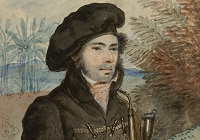DFG-Project on Adelbert von Chamisso
The Genesis of World Knowledge – How an object becomes knowledge
New research project on the culture of knowledge through the example of Adelbert von Chamisso’s voyage around the world
200 years ago in August 1815, the French-born German naturalist Adelbert von Chamisso (1781-1838) – today best known as poet and author of the 1814 novella „Peter Schlemihl’s Miraculous Story” (Peter Schlemihls wundersame Geschichte) – set out on a three-year voyage around the world on board the Russian brig “Rurik” under the command of captain Otto von Kotzebue. The expedition carried him across the Atlantic to the Pacific Ocean, from there to the coasts of Asia and America, to the Hawaiian and Ratak Islands, and, on the search for the Northeast Passage, through the Bering Strait and to the Arctic.
Coinciding with the anniversary of this historical voyage from 1815 to 1818, the German Research Foundation (DFG) has now granted financial support for an interdisciplinary research project that will assess and analyze the manuscripts and records that emerged in the context of Chamisso’s voyage. In cooperation with the literary scholar Prof. Dr. Walter Erhart at the University of Bielefeld and the project’s research associate Dr. Monika Sproll, the working group of Prof. Dr. Matthias Glaubrecht at the Center for Natural History (CeNak) at the University of Hamburg will carry out collection-based research on the historical scientific aspects of the project. Within the scope of a dissertation project (Anne MacKinney), Chamisso’s travel diaries, manuscripts, collected objects as well as the natural history and cultural findings accrued from these media will be contextualized and correlated.
The Chamisso-Project

Already since the 19th century, Chamisso has been counted among the canonized authors of German literary history. His account of the “Voyage around the World” based on the “Rurik” expedition from 1815 to 1818 belongs furthermore to the important travelogues for the period around 1800. The work is often compared to Georg Forster’s account of the voyage with James Cook in the South Sea from 1771 to 1775 or to Alexander von Humboldt’s works stemming from his travels through Latin America from 1799 to 1804. Despite Chamisso’s importance for the history of scientific travel and observation in the early 19th century, there still lacks a dependable, source-based edition of his two travel diaries composed during the voyage. In addition to the travel materials – these comprise only a part of Chamisso’s circa 29,500-page literary estate, which is held by the Berlin Staatsbibliothek (SBB) and has been digitalized in its entirety with the support of the Robert-Bosch-Stiftung – there also still exist in the Berlin Natural History Museum (MfN) numerous, still largely overlooked natural objects that Chamisso collected during the voyage and incorporated in various ways into his work.
With an interdisciplinary approach, the project will assess the literary as well as the natural history source materials and analyze the writings and the collections associated with Chamisso’s voyage of discovery. The project thereby intends to (re)discover an author, whose dual professions as poet and naturalist and whose role as a frontier crosser and intermediary between the study of literature and the nature have thus far been seldom acknowledged. Moreover, the project undertakes to make a fundamental contribution to the history of literature and the history of science by attending to the forms of writing and representing natural history knowledge as well as to the potent interactions between literature, aesthetics, natural history and ethnology in the 19th century.
Cultural history of natural knowledge
In addition to accompanying studies that contextualize the natural history findings from the expedition, the project’s main objective is a commented edition of the manuscripts and records (located in the Berlin Staatsbibliothek and available in digitalized format) that form the basis of Chamisso’s travel accounts on the one hand and his specialist publications on the other. This body of work will be made available as a hybrid-edition (print edition and digital publication) and will be enriched with a literary- and natural history-oriented commentary.
The edition of these materials is particularly valuable, not least because it promises to shed light on the development of world knowledge through global travel during a transition period that is highly significant for the history of science – the so-called Sattelzeit between the Enlightenment, Romantic and Modern periods.
Within the context of cultural histories of the study of nature in general and of research expeditions as enterprises for making the world accessible and knowable in particular, Adelbert von Chamisso’s work is thus far underrepresented. The edition of his earliest texts from the voyage around the world will allow us to understand for the first time the genesis of these texts and thereby understand Chamisso in a new light..
History of science dissertation project
- From „Objects of Knowledge“ to World Knowledge
Using actual natural history collection objects – that is, „objects of knowledge“ (Wissensdinge) –, which Adelbert von Chamisso brought back from his voyage on the “Rurik” between 1815 and 1818, the dissertation intends to reconstruct the processes, by which knowledge about the natural world were formed. Anne MacKinney will work in this project as research associate from 2015 to 2018.
Publications (in German) on Adelbert von Chamisso
- Chamisso-Forum
www.chamisso-forum.blogspot.de - Glaubrecht, M. (Hrsg.) 2012. Adelbert von Chamisso. Reise um die Welt.
Verlag Andere Bibliothek, Berlin. 526 pp.
www.die-andere-bibliothek.de - Tagesspiegel
Wohin? Zu mir! Zu mir! - Tagesspiegel
Mit Siebenmeilenstiefeln um die Welt - Tagesspiegel
Dichter, Forscher, Weltreisender - Frankfurter Allgemeine Zeitung
Traurige Aleuten - Frankfurter Allgemeine Zeitung
Mach es wie die Aleuten

